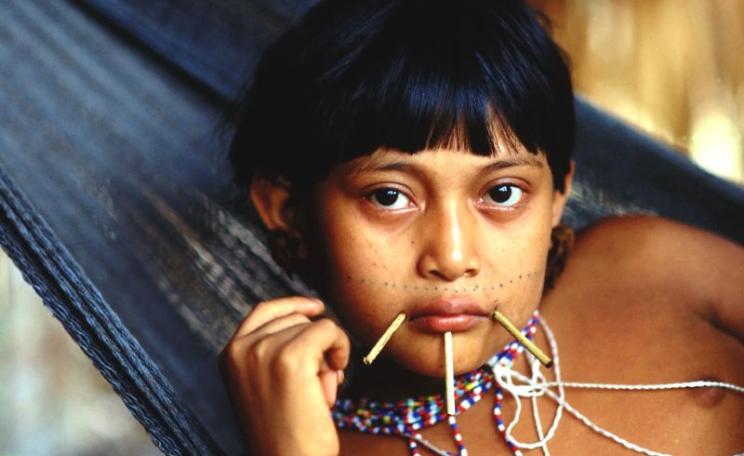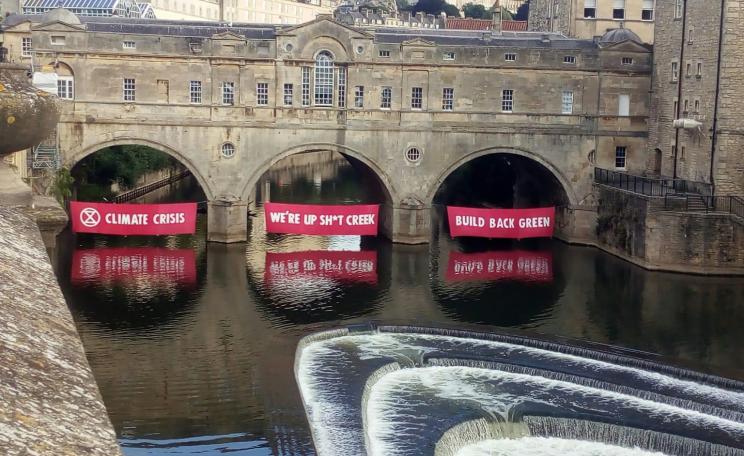At the time, I had just learned to defend our forest's limits. I was not yet used to the idea that I also needed to defend its trees, game, watercourses, and fish. But I soon understood that the gold prospectors were land eaters who would destroy everythi
With scarcely a day going by without further bad news about declines in global flora and fauna and increases in greenhouse gas emissions, it is no longer so easy to dismiss 'end of the world' myths in indigenous culture as quaint relics of outmoded cultures.
Indeed many of these myths seem uncannily relevant as we move steadily closer towards environmental catastrophe.
The 'falling sky' in the title of this book refers to the Yanomami belief that, after the death of the last shaman, no one will be left to hold up the sky so it will collapse on top of the earth again, as in the beginning of time. Davi Kopenawa, himself a Yanomami shaman, has a clear idea of the sequence of events:
"When the white people tear dangerous minerals out of the depths of the earth, our breath becomes too short and we die very quickly ... If the breath of life of all our people dies out, the forest will become empty and silent. Our ghosts will then go to join all those who live on the sky's back, already in very large numbers.
"The sky, which is as sick from the white people's fumes as we are, will start moaning and begin to break apart. ... It will truly be terrifying! The back of the sky bears a forest as vast as ours, and its enormous weight will brutally crush us all."
Davi is one of the leading representatives of the 32,000 Yanomami Indians, who inhabit the frontier region between Brazil and Venezuela, and over the years he has spoken out time and again against the damage being inflicted on his people and his beloved forest.
The gift of apt expression ...
He has a great knack for finding a telling word or image and, as one reads this engrossing book, it becomes clear that this skill stems in part from his personal trajectory, which means that, while maintaining the eye of an outsider, he knows 'white' society well.
Davi was brought up deep in the Amazon forest, but in 1967 he became an orphan at the age of 11, when his mother died in a measles epidemic, brought in by the evangelical New Tribes missionaries.
These missionaries, hell-bent on converting the Yanomami, even took advantage of the fact that the epidemic carried off far more Indians than white missionaries to drive home the superiority of their God (whom the Yanomami called Teosi, from the Portuguese Deus).
In his review of Davi's book, the ethnobotanist Glenn H. Shepherd quotes from the diary written at the time by the missionary Keith Wardlaw (whose daughter brought the measles into the village):
"God never makes a mistake and, now that the crisis is passed, we can see how the Lord is working in hearts through the things that have happened ... The power of God is at work and it is a great and marvelous thing to behold." Indeed! - as Shepherd drily observes.
At the time, I had just learned to defend our forest's limits. I was not yet used to the idea that I also needed to defend its trees, game, watercourses, and fish. But I soon understood that the gold prospectors were land eaters who would destroy everythi
Disoriented by grief, Davi was converted, if only for a brief period. He recalls the missionaries' treatment of his mother's corpse: "I was never able to learn where my mother was buried. The people of Teosi never told us, so we could not gather the bones of our dead.
"Because of them, I was never able to mourn my mother the way our people usually do. It is a very bad thing. It made me feel a deep sorrow and the anger from her death has persisted in me since that time. It hardened little by little and will only end with my own end."
The way of the shaman, the way of the campaigner
After several years he returned to the forest and went through the long and arduous process of training to become a shaman. In time, he decided to take on the role of spokesperson for his people, making journeys to Brasília and abroad in an effort to save the forest from destruction.
In one powerful passage, he describes the moment when he realised that he had to take on this role, on meeting the garimpeiros (gold prospectors) for the first time: "These fierce men appeared in the forest suddenly, coming from all over the place, and quickly encircled our houses in large numbers. They were frenetically searching for an evil thing that we had never heard about and whose name they repeated unceasingly: oru, gold.
"They started digging into the ground in every direction like herds of peccaries. They soiled the rivers with yellowish mire and filled them with xawara epidemic fumes from their machines. Then my chest filled up with anger and worry again when I saw them ravage the river's sources with the avidity of scrawny dogs. All this to find gold, so the white people can use it to make themselves teeth and ornaments or keep it locked in their houses!
"At the time, I had just learned to defend our forest's limits. I was not yet used to the idea that I also needed to defend its trees, game, watercourses, and fish. But I soon understood that the gold prospectors were land eaters who would destroy everything.
"These new words about protecting the forest came to me gradually, during my trips in the forest and among the white people. They settled inside me and increased little by little, linking up to each other, until they formed a long path in my mind. I used them to start speaking in the cities, even if in Portuguese my tongue still seemed as tangled as a ghost's!"
He was on one of these journeys in June 2014 that he spoke to The Ecologist. And it was on an earlier trip that he was befriended by the French anthropologist, Bruce Albert, who became a regular visitor to his village, and ultimately his co-author.
This book is the result of over 100 hours of taped conversation, in the Yanomami language, between Davi and Albert. The serendipity of this friendship means that Davi's rich exposition of Yanomami culture and his biting criticism of ‘white civilisation' can now reach a broad audience.
A talent for seeing what we do not
Time and again Davi's observations make us squirm: "The houses in the centre of this city [New York] are tall and beautiful, those on its edges are in ruins. The people who live in those places have no food and their clothes are dirty and torn. When I took a walk among them, they looked at me with sad eyes. It made me upset.
"These white people who created merchandise think they are clever and brave. Yet they are greedy and do not take care of those among them who have nothing. ... They do not even look at them and are satisfied to keep their distance. And they call them 'the poor' [Davi uses the Portuguese word]. They even take their crumbling houses from them ... It scared me to see such a thing."
Not all of this book is easily digestible. In particular, there is a complex section at the beginning, in which Davi talks about the Yanomami's spiritual world and the journeys he makes, flying above the forest with the xapiri (forest spirits) while under the influence of yãkoana (hallucinatory snuff). The most accessible section is Davi's account of his personal journey.
Davi has an uncanny way of making us question the way we live, be we anthropologists in search of baskets, bow and arrows: "Why do they so often ask us for these objects? Do they want to get them in anticipation of our deaths? Will they also want to take our bones to their cities? Once dead, will we also be exhibited in the glass cases of a museum?"
Or environmental activists: "The lives of white people who hurry around all day like xiri na ants seem sad to me. They are always impatient and anxious not to get to their job [another word in Portuguese] late. They barely sleep and run all day in a haze."
Davi believes that the world has lost its way. It is hard to disagree.
Sue Branford is an editor at Latin America Bureau. She has written five books, mainly on Brazil, including (with Jan Rocha) 'Cutting the Wire - the Story of the Landless Movement in Brazil'. Formerly she worked at the BBC World Service as a Latin America analyst.
The book: 'The Falling Sky - Words of a Yanomami Shaman' is by Davi Kopenawa and Bruce Albert, translated by Nicholas Elliott and Alison Dundy, and published by the Berknap Press of Harvard University Press 2013 [ISBN 978-0-674-72468-6].





